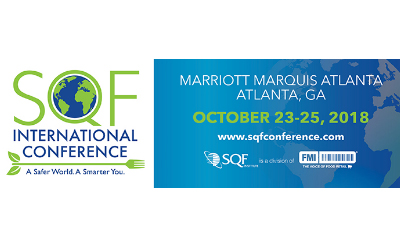Well-known food and beverage brands will often turn to contract manufacturers to produce the quality products that their customers expect and enjoy. With their brand names on the line, these brand owners need assurance that their suppliers can deliver safe and high-quality goods and mitigate the looming threat of recalls.
How do they know if they’re working with a reliable contract manufacturer? Well, many will look to see if they hold certifications from a reputable third-party organization, such as the Safe Quality Food Institute (SQFI). In fact, one in four companies today require that their suppliers have SQF certification, making it one of the most important certifications in contract manufacturing.
SQF certification demonstrates that a supplier has met benchmarked standards—set by the Global Food Safety Initiative (GFSI)—for upholding quality and controlling food safety risks. It’s a form of validation of an organization’s ability to consistently produce safe and high-quality products. Contract manufacturers that have SQF certification are more likely to win contracts and can bid for business on a national or global scale. Thus, it presents a clear competitive advantage to those certified in the various levels of SQF certification.
Certification Tiers
SQF is a three-level certification program, with each tier progressively more rigorous than the last.
- Level 1: The SQF Safety Fundamentals Program is an introduction to food safety standards for small- to medium-sized food suppliers. Ideal for those with low-risk food products, the program doesn’t meet GFSI standards but establishes a foundation for doing so. Suppliers certified at this level typically sell their services to smaller, local purveyors.
- Level 2: The SQF Food Safety Program follows GFSI-benchmarked food safety standards. It helps sites implement preventive food safety measures according to Hazard Analysis and Critical Control Points (HACCP) regulations, which ensure scientific analysis of microbiological, physical and chemical hazards are applied at each step of the supply chain. This level is ideal for businesses that would like to work with purveyors that require adherence to GFSI benchmarked standards.
- Level 3: The SQF Food Safety and Quality Program shows an ability to not only contain safety risks through the HACCP system, but also monitor and control threats related to food quality. This highest level of certification is ideal for large-scale producers, manufacturers, food packaging facilities and distributors that have successfully deployed an SQF Food Safety Program and want to go above and beyond in their quality efforts.
While it’s the most demanding of the three, Level 3 certification is what most contract manufacturers should aspire to because it’s required by many of the world’s largest food and beverage brands. In order to attain this level of distinction, contract manufacturers need an effective way to demonstrably meet all GFSI benchmarked standards and readily access their quality data during an audit. This is where statistical process control (SPC) comes in.
The SPC Gamechanger
SPC is a proven methodology for monitoring and controlling quality during the manufacturing process. SPC enables manufacturers to chart real-time quality data against predefined control limits to identify unwanted trends and product or process variations. If there is an issue, timely alerts will notify responsible parties to take remedial action early on, preventing unsafe or poor-quality goods from entering the supply chain and triggering a recall. This establishes strong controls for food quality and safety in accordance with a Level 3 SQF Program. Audits also become a breeze, as all historical data are stored digitally in a centralized repository. Suppliers can thereby quickly and easily produce auditor-requested reports showing compliance with SQF requirements and GFSI standards.

But beyond quality monitoring and facilitating audits, SPC can deliver greater impact by providing suppliers with analytical tools useful for mining historical data for actionable insights. They can run comparative analyses of the performance of different lines, products, processes, or even sites, revealing where and how to further reduce risk, improve consistency, streamline operations, and lower production costs. In this way, SPC lends itself to a profit-positive business model—driving additional savings through process improvement while increasing new business opportunities through contracts won via SQF certification.
A Snacking Success
One contract manufacturer of savory and healthy snacks previously struggled with large variations in product quality. These inconsistencies often resulted in quality holds or process aborts that generated high waste and costs. By implementing SPC, the snack supplier was able to take advantage of a wide range of data—including incoming receiving tracking and quality inspection tracking—to finetune its production processes with effective controls for food quality and safety. In addition to a 30% reduction in customer complaints, SPC has helped the supplier realize a $1 million reduction in product waste and attain Level 3 SQF certification, the latter of which has generated continued new business from several well-known snack food brands.
This snack supplier is a clear example of SQF certification as a competitive differentiator. Working with such SQF-certified and SPC-powered contractors is important to food and beverage brands because they can protect their reputations and ensure continued customer retention by way of safe, consistent, high-quality products. Ultimately, it builds greater trust and integrity in the supply chain among companies and consumers alike.




